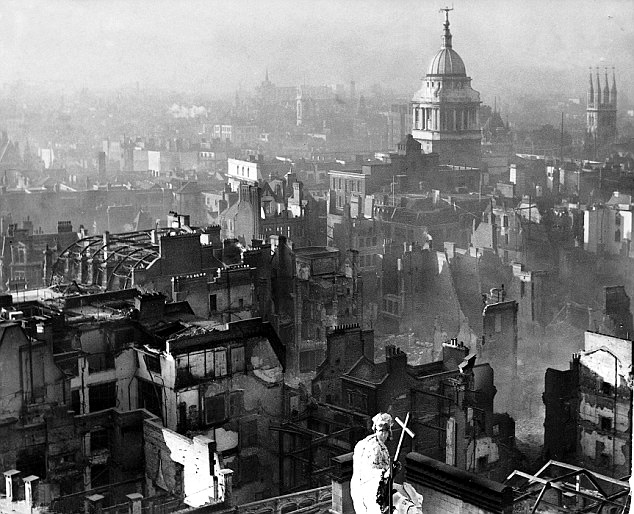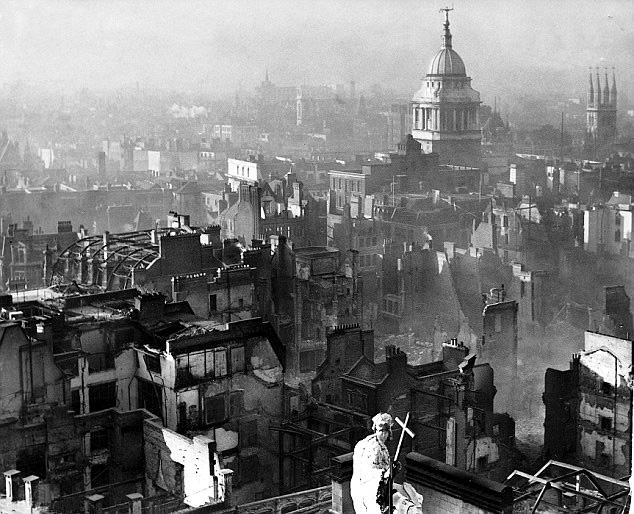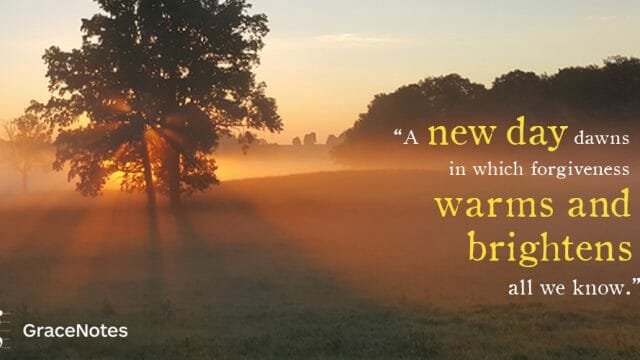Sacrifice and loss are a prelude to victory.

As I introduced myself, I was arrested by his powerful, vice-like grip, the handshake from the dominant right-hand of an 88-year-old man. As a segue into his chief medical complaint that day in the Royal Alexandra Hospital Emergency Room (ER), I asked what he did in his earlier years. Prior to his full-time occupation as a machinist, he was a gunner with the Royal Canadian Air Force in World War II. He and his pilot flew some 30 sorties over various parts of German-occupied Europe.

I was curious about her accent, so I asked from what part of England she was from. She was 80, and even though she had lived in Canada most of her life, her Cockney accent was still musically evident. She spent her childhood in East London, so with a quick bit of math I asked if she was there during World War II. Indeed, she recalled having to run home from school to hide in the makeshift bomb-shelter each home was to have prepared.
Simultaneous and at times overwhelming stresses are routine at “The Alex.” So when precious moments like these are afforded, I’ll take an extra breath to enter the museum of memories curated for me.
This year marks 106 years since the beginning of The Great War, World War I, and 75 years since the end of World War II. In these wars, battlefield deaths numbered in the hundreds of thousands, while casualties and deaths among civilians soared into the millions. During World War I more than 16 million lives were lost. During World War II more than 80 million people were wiped off the face of the earth.
I’m thankful that we didn’t have to live in that volatile time of earth’s history. I’m indebted to those who fought, sacrificed, and laid down their lives that we may live in peace and freedom today.
Cosmic War
War and sacrifice take on greater significance and deeper meaning when it comes to the history of this earth. If D-Day on the beaches of Normandy was a turning point in World War II, the war that changed the course of history was won on a hill called Golgotha, also known as Calvary.
In war, the strongest, swiftest, and smartest win. How is it then, that in this cosmic war death was considered victorious (1 Cor. 1:17)? We all must contend with the embarrassing paradox of God nailed to a cross. Can we imagine how utterly disappointed and disillusioned His disciples, His closest friends on earth, must’ve been as they watched all this unravel? Wasn’t He supposed to be their king? Wasn’t He going to deliver them from Roman occupation and establish His kingdom?
As imposing as the question about who Jesus was is the question of why He had to die. The simplest answer is that He died for us because He loves us and wanted to forgive our sin—anything that separates us from God and from each other.
But it’s sometimes not that easy to accept. In moments of doubt, I’ve taken a step back to look at this war between God and Satan, and it all seems so far-fetched, so surreal. But then life itself, and death, are also quite surreal.
After a difficult day in the ER I’ll often reflect on how mysterious it is for someone one moment to have a voice, be it through a groan, blinking eyes through a grimace, beating heart beeping on a monitor. There’s a sudden stillness, an unwelcome silence, and a bitter nothingness in death; just a motionless physical body.
While it is religiously acceptable to say that death is the end-point effect of sin, it is not morally digestible for many to believe in an omniscient, omnipotent God who allows so much unnecessary suffering. How can He permit the genocide of innocent millions? How can He allow earthquakes or tsunamis to end thousands of lives? How can He allow newborn babies to be born with terminal illnesses? Is God really there? The Cross of Calvary, where Jesus was crucified, manages to expose the magnitude and problem of sin and simultaneously express the magnitude of God’s love. He does care (James 1:14, 15; 1 Cor. 1:18).
Although we cannot obtain the answer to every immoral and unjust occurrence in life, we can say that God cares (Isa, 53:4-7; John 3:16, 17). In the same breath, we must also recognize that Planet Earth, and all that’s in it (including ourselves), is not in the state in which it was created. The laws of nature, and the nature of our hearts, have become polluted and perverted. The world is not the way it’s supposed to be. Knowing this doesn’t make pain and suffering go away. But pain in this life is important: it’s a symptom, an indicator of underlying problems in the human body, as well as in the world in which we live.
On Which Side Are We On?
To say “we must declare war on sin” is somewhat melodramatic. Nonetheless, I can think of no better statement in the context of the expansive war between God and Satan, in which each of us is personally engaged (1 Peter 2:11). Without defining the problem early in our own lives, much like the aloof position many countries took at the beginning of World War II, the enemy will advance and intensify his forces, making him more difficult and painful to defeat. Some of us might even be unfortunate enough to face a Pearl Harbor-like event in our lives, in which panic and desperation result from a blindsided catastrophe.
In every ordinary, preoccupied day of our lives, there is a Battle of Vimy Ridge or a Battle of Midway in the battlefields of our minds (1 Peter 5:8). We know these from personal experience. By deciding to follow Christ each day (Luke 9:23-26), we gain access to resolve (Rom. 8:11) and declare ourselves free from the enemy—Satan (Gen. 3:4, 5; 2 Cor. 4:4).
Many who went into the World Wars were not finely tuned human specimens, such as Navy Seals or Green Berets. Perhaps they were doting fathers, newlywed husbands, or promise-filled sons nowhere close to seeing their potential. Many were rural lads dragged from quiet farms or urban boys pulled from comfortable city dwellings.
Filled with youthful energy, they were nervous and naive of the dangers that lay ahead in the trenches. Expand the picture to include bystanders, innocent civilians, anxious expectant mothers, pure and sanguine children killed in a war they never agreed to or asked to be part of. A lot about war was then and still is immoral and inexcusable. Uninvolved helpless lives lost. It’s not fair. But to which war am I referring?
Remembrance Day (the eleventh hour of the eleventh day of the eleventh month), observed in countries around the world by various names, is a special time to honor those who’ve served and sacrificed their lives for their countries. They deserve our utmost respect (John 15:13).
But more colossal than both World Wars put together is the war on earth that started in heaven. Every person on this planet is directly affected and involved (Eph. 6:13-17; Luke 10:18; Rev 12:7-12). It’s a reality we must also remember.
Jesus, the omnipotent conqueror of death, will soon return to unify all those who joined His ranks from earth’s battlefield to a time and place where all the wretched consequences of cosmic war will forever be past (John 14:1-4; Rev. 1:7; 21:4). On that day we will share in His victory.








